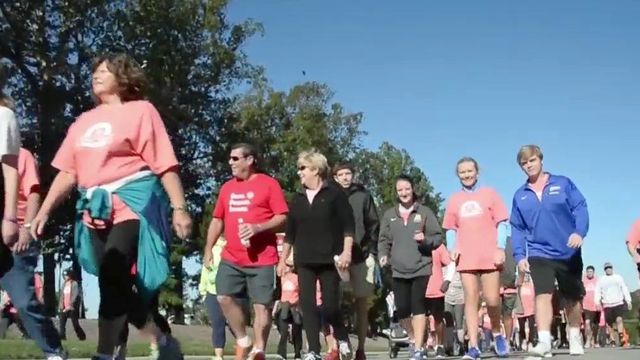'You don't understand what it's like:' Walk for Hope aims to destigmatize mental illness
Only 17 percent of adults in the United States are considered to be in a state of "optimal mental health," according to the Centers for Disease Control and Prevention. Even with those statistics, there is often a stigma associated with mental health issues.
Posted — UpdatedIn retrospect, April Koontz said she didn’t completely understand her brother’s turmoil.
“He would talk to me about God, [saying] ‘You don’t understand what it’s like to be inside of me, like I can’t deal with these emotions,’” she said.
Jeremy Koontz later died of an unintentional opioid overdose- the drug he used to numb his pain.
Christopher Murray can empathize. In 2006, his father, Carrboro Fire Chief Rodney Murray, took his own life.
“It is so difficult to truly understand the struggle of what somebody is going through when you don’t struggle with it yourself and for me not to judge him,” Christopher Murray said.
April Koontz and Christopher Murray both lost loved ones who struggled with mental illness. They have their shared grief in common, but also the Walk for Hope- an opportunity to put “feet to faith” with the goal of changing conversations about mental health.
Van Eure heads up the walk, which was born out of her father’s concern for her brother.
“My brother, when he was around 16 years old, started showing signs of something that was pretty severe,” she said.
Eure’s brother was shuttled to hospitals in an attempt to get a diagnosis.
“Everything they heard was, ‘We know nothing about this illness. We know nothing of illnesses of the brain,’” Eure said.
Today, there are more than 200 classified forms of mental illness. As a family practitioner, Dr. Nicole Swiner sees how mental illness often manifests in different forms.
“The majority of the things that I treat can be prevented if we fix it at the root, and most of that is with stress and with mental issues,” she said.
Swiner said she does her part to destigmatize mental health treatment and medications.
“Just like I’m treating your blood pressure or your sugar,” she said. “Sometimes, it’s something that’s inside of us, and you can’t really control it externally, or, if you were born with a certain genetic risk or predisposition for it, sometimes we have to do what we have to do.”
Walk for Hope and the Foundation for Hope are working tirelessly to help the masses come to the understanding that mental health is part of overall health.
The 29th annual Walk for Hope will take place Sunday at 10 a.m., and 100 percent of the proceeds will to go mental health research at the University of North Carolina’s Department of Psychiatry.
“I am looking forward to seeing everyone’s face when they are on the walk and just the hope that everyone has about how treatment is done in North Carolina,” said Stephanie Zerwas with the UNC Center of Excellence for Eating Disorders.
• Credits
Copyright 2024 by Capitol Broadcasting Company. All rights reserved. This material may not be published, broadcast, rewritten or redistributed.






